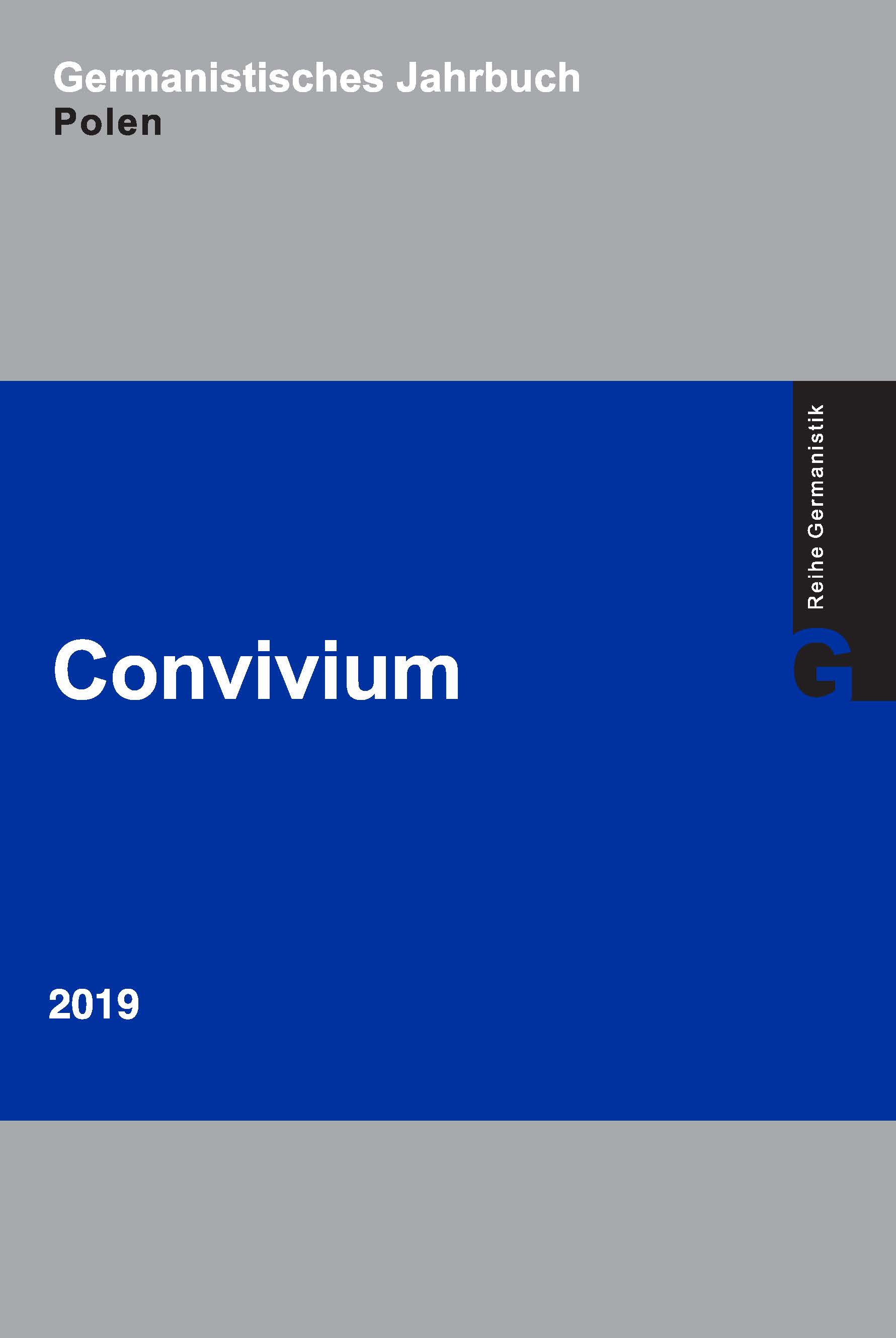The Impact of “Cold Acting” in LESSING and DIDEROT?
DOI:
https://doi.org/10.18778/2196-8403.2019.02Keywords:
Denis Diderot, Gotthold Ephraim Lessing, theatre theory, affect theories, EnlightenmentAbstract
This article presents the debate on theatre theory that arose in the 18th century and in which DIDEROT and LESSING participated. The conflict revolved around the question whether an actor should convey authentic emotions and identify with the character he/she plays or whether he/she should act in an unemotional and controlled way without becoming absorbed in the role. While DIDEROT delivers many arguments for “the cold actor”, LESSING pleads for a mix of “fire” and “coldness”. The thesis of this article is that LESSING’S “coldness” is justified by an Enlightenment common sense morality that can be seen as akin to Adam Smith’s ideas, while DIDEROT defends the “cold” way of acting in the name of aesthetic values which serve to assure a high artistic level of performance. The article looks at how some implications of these statements about “cold” and “hot” feelings are critically related to contemporary emotion theories.
References
ABBT, CHRISTINE / FESTL, MICHAEL G. (2018) (eds.): Politik, Schauspiel, Philosophie. Eine Auseinandersetzung mit Denis Diderots Paradox über den Schauspieler. Studia Philosophica Vol. 77. Schweizerische Zeitschrift für Philosophie.
Google Scholar
DIDEROT, DENIS (1981): Erzählungen und Gespräche. Aus dem Französischen von Katharina Scheinfuß. Leipzig.
Google Scholar
GOLAWSKI-BRAUNGART, JUTTA (2005): Die Schule der Franzosen. Zur Bedeutung von Lessings Übersetzungen aus dem Französischen für die Theorie und Praxis seines Theaters. Tübingen / Basel.
Google Scholar
JAUß, HANS ROBERT (1961): Diderots Paradox über das Schauspiel (Entretiens sur ‚Le Fils Naturel‘). In: Germanisch-Romanische Monatsschrift, NF, XI, 380-413.
Google Scholar
LEHMANN, JOHANNES FRIEDRICH (2000): Der Blick durch die Wand. Zur Geschichte des Theaterzuschauers und des Visuellen bei Diderot und Lessing. Freiburg.
Google Scholar
LESSING, GOTTHOLD EPHRAIM (2010): Minna von Barnhelm/Hamburgische Dramaturgie. Text und Kommentar, ed. BOHNEN, KLAUS. Berlin.
Google Scholar
MELLMANN, KATJA (2006): Literatur als emotionale Attrappe: eine evolutionspsychologische Lösung des „paradox of fiction“. In: KLEIN, UTA / MELLMANN, KATJA / METZGER, STEFFANIE (eds): Heuristiken der Literaturwissenschaft: disziplinexterne Perspektiven auf Literatur. Paderborn, 145-166.
Google Scholar
PALMIER, JEAN-PIERRE (2014): Gefühlte Geschichten. Paderborn.
Google Scholar
DOI: https://doi.org/10.30965/9783846755815
RICCOBONI, FRANCESCO (2017): Die Schauspielkunst. In: ROSELT, JENS (ed.): Seelen mit Methode – Schauspieltheorien vom Barock bis zum postdramatischen Theater. Mit einer Einführung von Jens Roselt. Berlin, 116-123.
Google Scholar
ROSELT, JENS (2017) (ed.): Seelen mit Methode – Schauspieltheorien vom Barock bis zum postdramatischen Theater. Mit einer Einführung von Jens Roselt. Berlin.
Google Scholar
SAINTE-ALBINE, PIERRE RÉMOND DE (2017): Der Schauspieler. In: ROSELT, JENS (ed.): Seelen mit Methode – Schauspieltheorien vom Barock bis zum postdramatischen Theater. Mit einer Einführung von Jens Roselt. Berlin, 102-111.
Google Scholar
SCHMIDT, JOCHEN (1985): Die Geschichte des Genie-Gedankens in der deutschen Literatur, Philosophie und Politik 1750-1945: Bd. 1: Von der Aufklärung bis zum Idealismus. Darmstadt.
Google Scholar
SHAKESPEARE, WILLIAM (1984): Hamlet. Englisch/Deutsch, ed. und aud dem Englischen übers. von KLEIN, HOLGER M. Stuttgart.
Google Scholar
SMITH, ADAM (2000): The Theory of Moral Sentiments. New York.
Google Scholar
STEPHAN, ULRIKE (1986): Gefühlsschauspieler und Verstandesschauspieler. Ein theatertheoretisches Problem des 18. Jahrhunderts. In: KÖRNER, HANS / PERES, CONSTANZE / STEINER, REINHARD / TAVERNIER, LUDWIG (eds.): Empfindung und Reflexion. Ein Problem des 18. Jahrhunderts. Hildesheim / Zürich / New York, 99-116.
Google Scholar
VOLAND, ECKART (2007): Virtuelle Welten in realen Gehirnen. Evolutionspsychologische Aspekte des Umgangs mit Medien. In: LiLi 146:7-22.
Google Scholar
DOI: https://doi.org/10.1007/BF03379655
WALTON, KENDALL L. (1978): Fearing Fictions. In: The Journal of Philosophy 75:5-27.
Google Scholar
DOI: https://doi.org/10.2307/2025831
Downloads
Published
How to Cite
Issue
Section
License

This work is licensed under a Creative Commons Attribution-NonCommercial-NoDerivatives 4.0 International License.










